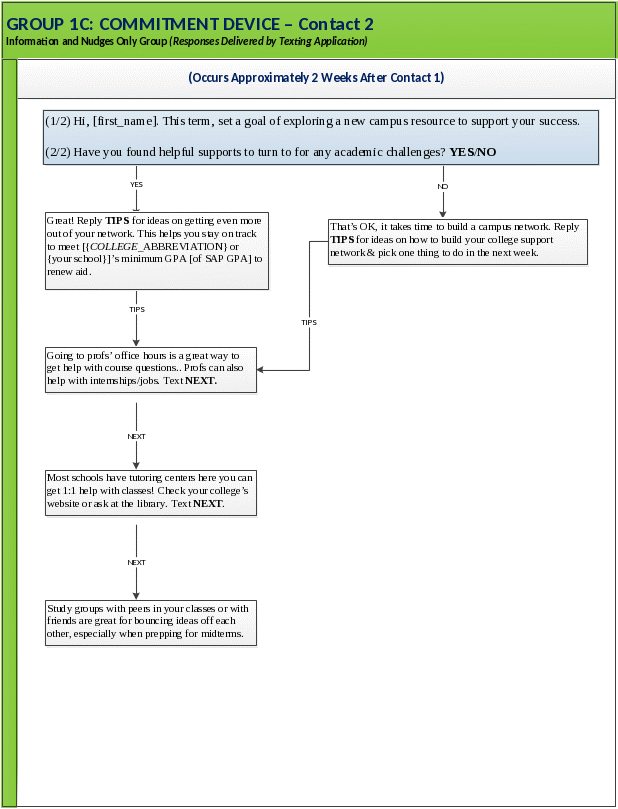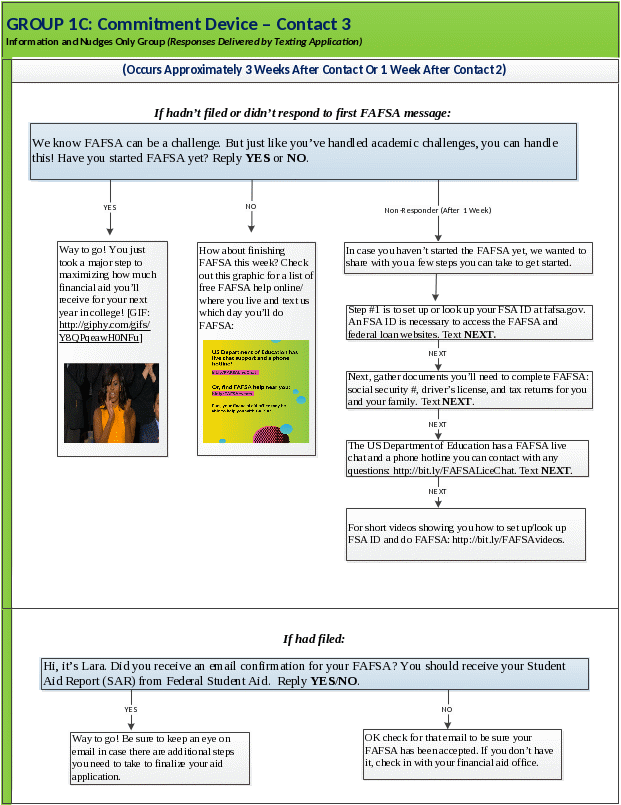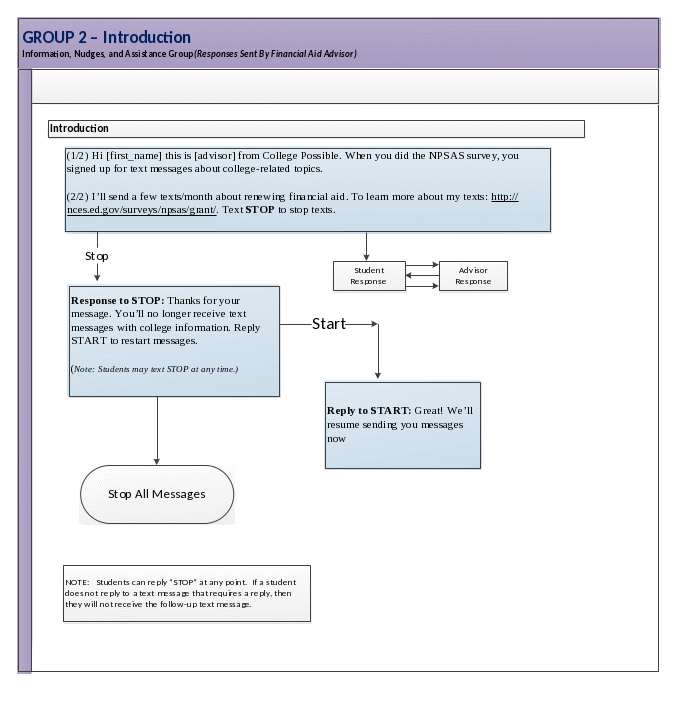NCER-NPSAS Grant Study - Financial Aid Nudges 2017: A National Experiment to Increase Retention of Financial Aid and College Persistence
NCER-NPSAS Grant Study - Financial Aid Nudges 2017: A National Experiment to Increase Retention of Financial Aid and College Persistence
Appendix A NCER-NPSAS Grant Study-Financial Aid Nudges- Contact Materials
NCER-NPSAS Grant Study - Financial Aid Nudges 2017: A National Experiment to Increase Retention of Financial Aid and College Persistence
OMB: 1850-0932
NCER-NPSAS Grant Study
Financial Aid Nudges 2017: A National Experiment to Increase Retention of Financial Aid and College Persistence
Appendix A
Intervention Communication Materials
OMB
# 1850-0932 v.3
Submitted
by:
National Center for Education Statistics
U.S.
Department of Education
Table of Contents
Group 1 – Information and nudges only 2
Text Messages for Group 1A 2 Text Messages for Group 1B 7 Text Messages for Group 1C 12
Group 2 – Information, nudges, and assistance 17
NCER-NPSAS Grant Studies Website 21
Summary of Groups Receiving Text Messages
Group 1 – Information and nudges only. Students will receive automated and predetermined texts. Automated replies will be sent in response to key words included in texted responses from students. Group 1 includes three variations.
Group 1A - Provides a basic presentation of the information.
Group 1B - Leverages positive social norms/pressure to encourage students to complete important tasks.
Group 1C - Provides students with concrete planning prompts to encourage them to schedule specific days and times to complete important tasks.
Group 2 – Information, nudges, and assistance. Students will receive initial text content similar to that received by students in Group 1. A financial aid advisor will respond to any replies and provide the student the opportunity to engage in a dialogue on financial aid topics.
Attachment VI
Intervention Text Messages
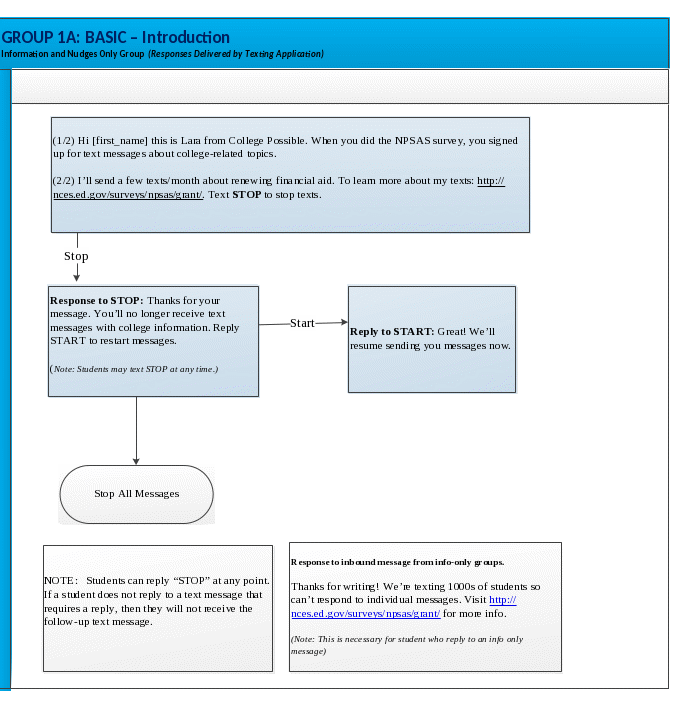
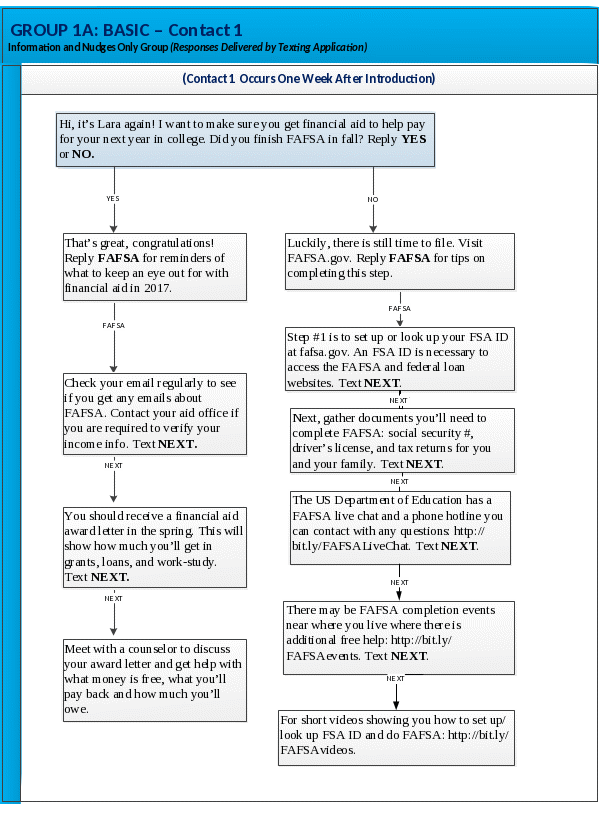

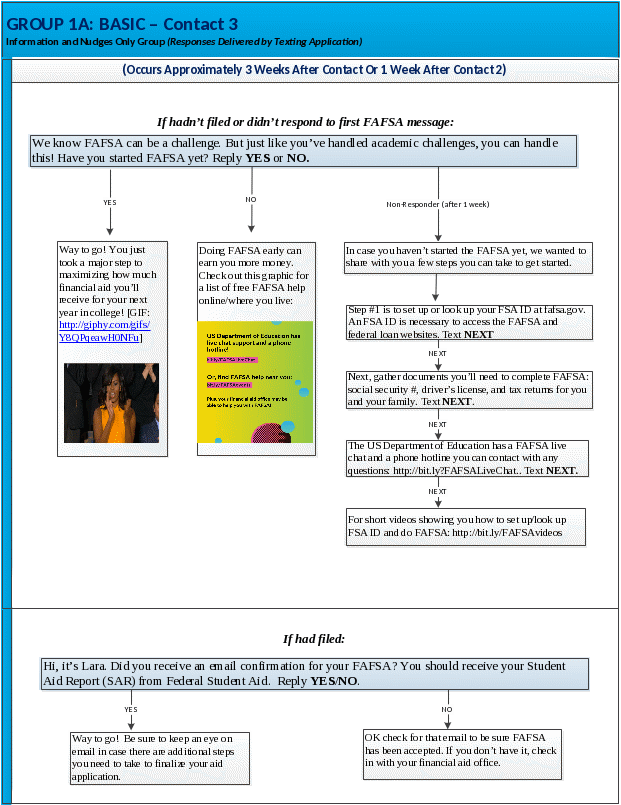
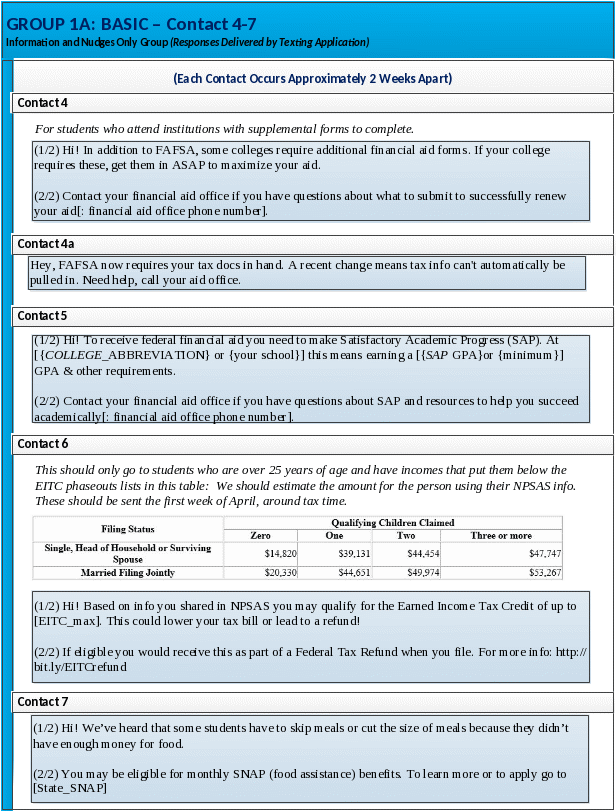



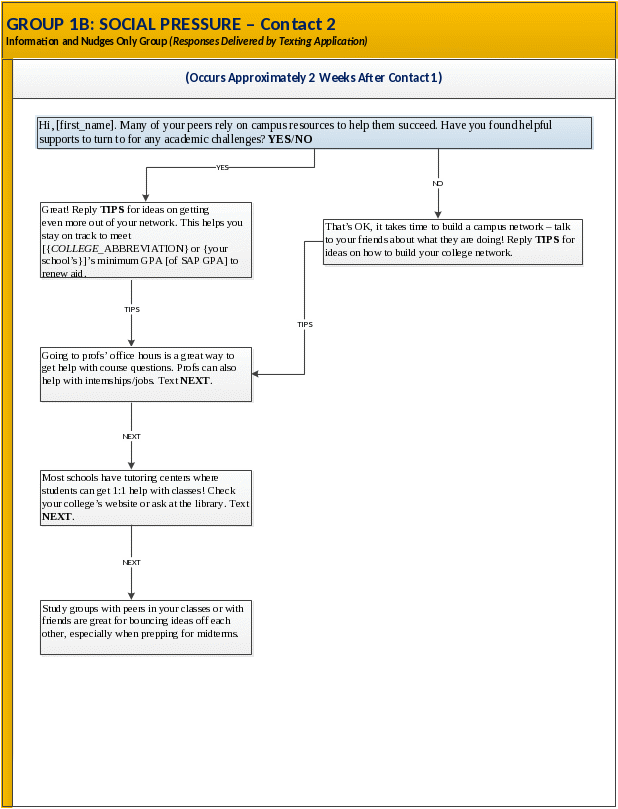



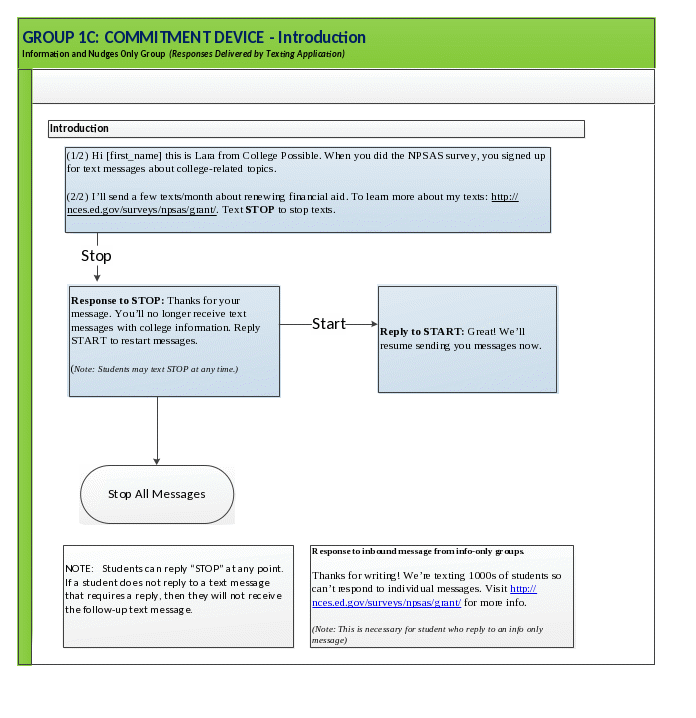

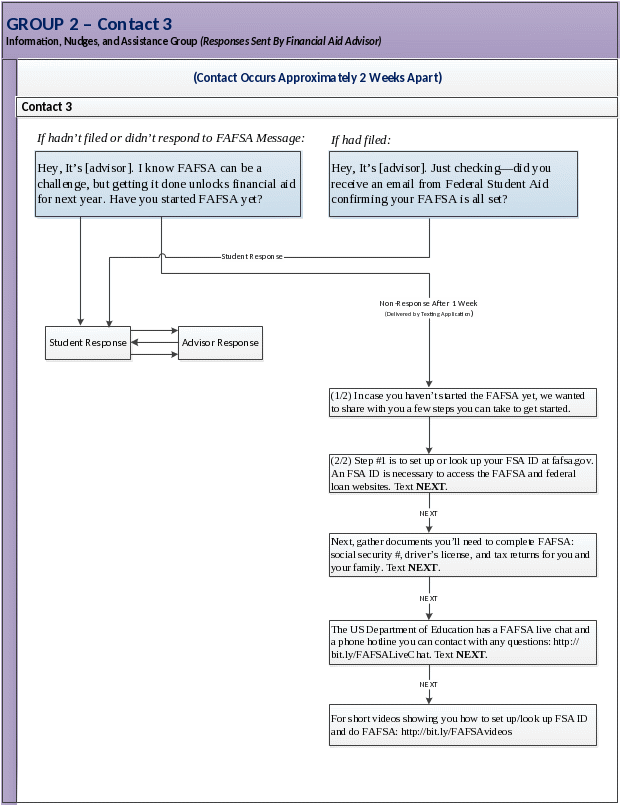
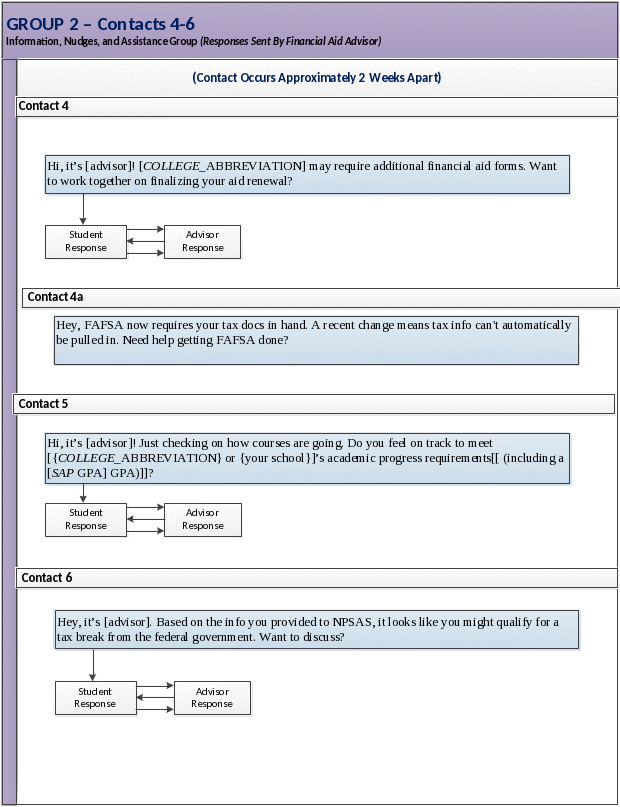
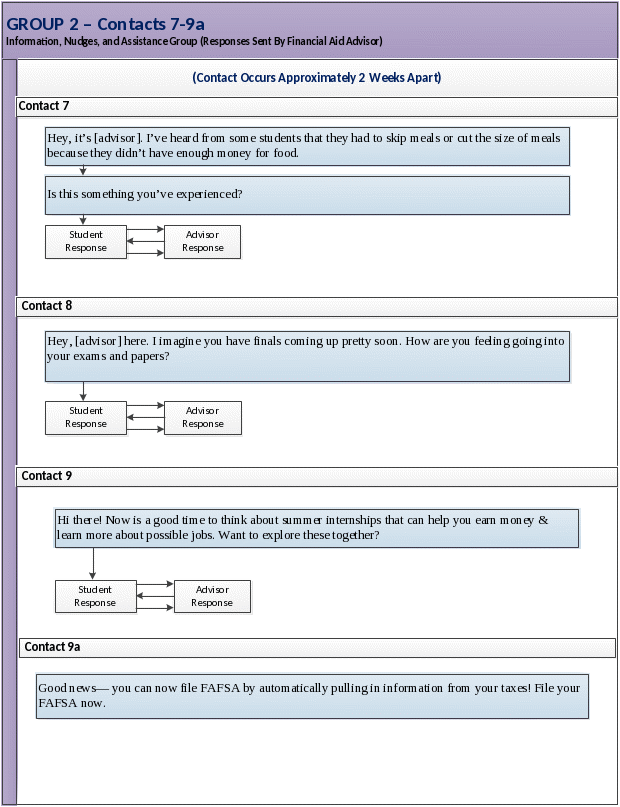
NCER-NPSAS Grant Studies Website
http://nces.ed.gov/surveys/npsas/grant/
NCER-NPSAS Grant Study: Financial Aid Nudges 2017: A National Experiment to Increase Retention of Financial Aid and College Persistence
Purpose
This NCER- NPSAS Grant Study, Financial Aid Nudges 2017: A National Experiment to Increase Retention of Financial Aid and College Persistence investigates whether an intervention that provides financial aid information, reminders, and advising to college students increases completion of the Free Application for Federal Student Aid (FAFSA) and compliance with the Satisfactory Academic Progress (SAP) requirements of the Pell grant program. This research is being conducted under a grant awarded through the NCER- NPSAS grant opportunity. The primary grantee is Sara Goldrick-Rab, Temple University (Grant Award #R305A160400), and the co-principal investigators are: Benjamin Castleman, University of Virginia; Lindsay Page, University of Pittsburgh; and Bruce Sacerdote, Dartmouth College. Data collection will be led by the research organization contracted by the National Center for Education Statistics to conduct NPSAS, RTI International (RTI), with College Possible and Signal Vine subcontracted for this study. A project description is available at: https://ies.ed.gov/funding/grantsearch/details.asp?ID=1848.
NCER-NPSAS Grant Opportunity
In 2010, the National Center for Education Research (NCER) and the National Center for Education Statistics (NCES), both within the U.S. Department of Education’s Institute of Education Sciences (IES), began collaborating on an education grant opportunity related to the cross-sectional National Postsecondary Student Aid Study (NPSAS). Under the NCER-NPSAS grant opportunity, researchers could submit applications to the Postsecondary and Adult Education topic within the Education Research Grants program (CFDA 84.305A), under either the Exploration or Efficacy and Replication research goal. Consistent with these two goals, NCER supports research projects using NPSAS to: 1) explore relationships between malleable factors (e.g. information on benefits of financial aid and FAFSA renewal) and postsecondary persistence and completion, as well as the mediators and moderators of those relationships; and 2) evaluate the efficacy of interventions aimed at improving persistence and completion of postsecondary education (e. g. financial aid and FAFSA renewal advice delivered via mail and email). Researchers approved for funding through this program can obtain indirect access to a subsample of the national NPSAS sample (after the study’s student interviews are completed) in order to conduct unique research projects that adhere to the guidelines set forth in the Request for Applications for the Education Research Grants Program, as well as guidelines set forth by NCES and the NPSAS program.
On July 1, 2016, two grants were awarded using a subsample of 2015-16 NPSAS sample members:
Financial Aid Nudges: A National Experiment to Increase Retention of Financial Aid and College Persistence. A project description is posted here: http://ies.ed.gov/funding/grantsearch/details.asp?ID=1848) , and
Could Connecting Students with Financial Aid Lead to Better College Outcomes? A Proposal to Test the Effectiveness of FAFSA Interventions Using the NPSAS Sample (referred to as “Connecting Students with Financial Aid (CSFA) 2017”). A project description is posted here: http://ies.ed.gov/funding/grantsearch/details.asp?ID=1853).
Confidentiality
Since these NCER-NPSAS grant studies are conducted using a subset of NPSAS:16 sample members, all data collection must be done through NCES and the NPSAS:16 data collection contractor, RTI International. This ensures that the confidentiality of the study participants is protected. Specifically, the grantee will have no access to personally identifiable information and is prohibited from having direct contact with sample members. RTI International follows strict procedures to protect the privacy and confidentiality of study participants. All project staff members have signed confidentiality agreements and affidavits of nondisclosure. Any data released to the public will be in aggregate form (e.g., statistical tables, graphs). Information obtained may be used only for statistical purposes and may not be disclosed, or used, in identifiable form for any other purpose, except as required by law (ESRA 2002, 20 U.S.C., § 9573).
Paperwork Reduction Act
The National Center for Education Statistics (NCES) is authorized to conduct the National Postsecondary Student Aid Study (NPSAS) and its follow up studies, including the Financial Aid Nudges 2017 study, by the Education Sciences Reform Act of 2002 (ESRA 2002, 20 U.S.C., § 9543), and to collect students’ education records from educational agencies or institutions for the purposes of evaluating Federally supported education programs under the Family Educational Rights and Privacy Act (FERPA, 34 CFR §§ 99.31(a)(3) and 99.35). Data collected from or about individual students are used only for statistical purposes and may not be disclosed or used, in identifiable form, for any other purpose except as required by law (ESRA 2002, 20 U.S.C. § 9573). These data are being collected for NCES by RTI International, a nonprofit research organization based in North Carolina, and its subcontractors Signal Vine and College Possible.
According to the Paperwork Reduction Act of 1995, no persons are required to respond to a collection of information unless it displays a valid OMB control number. The valid OMB control number for this voluntary information collection is 1850-0932. The time required to read and respond to text message prompts in the Financial Aid Nudges 2017 study is approximately 7 minutes per contact. If you have any comments concerning the accuracy of the time estimate, suggestions for improving this study, or any comments or concerns regarding the status of your individual submission in this study, please write directly to: The Financial Aid Nudges 2017 Study, National Center for Education Statistics (NCES), Potomac Center Plaza, 550 12th St., SW, PCP-4007, Washington, DC 20202.
OMB Clearance No: 1850-0932 Expiration Date: 01/31/2020
| File Type | application/vnd.openxmlformats-officedocument.wordprocessingml.document |
| Author | Franklin, Jeff |
| File Modified | 0000-00-00 |
| File Created | 2021-01-22 |
© 2026 OMB.report | Privacy Policy

